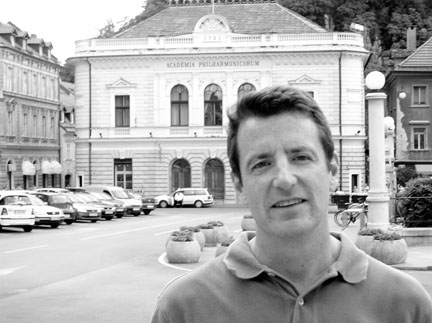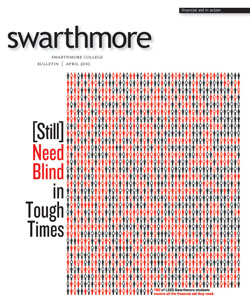Celebrated Mafioso of Historical Reinterpretation
 “History, for me, is first of all stories,” says Professor of History Pieter Judson ’78, comparing the “story” that is history to a movie.
“History, for me, is first of all stories,” says Professor of History Pieter Judson ’78, comparing the “story” that is history to a movie.
“A good movie has a really good plot, a plot that satisfies me, that I can’t quite figure out,” he explains.
Perhaps this explains Judson’s fascination with Eastern and Central Europe and its history of turmoil.
Judson’s own most recent “story,” Guardians of the Nation: Activists on the Language Frontiers of Imperial Austria (2007), garnered him the 2010 Karl von Vogelsang State Prize for History and Social Sciences. Awarded every two years by the Austrian Ministry for Science and Research, the prize recognizes outstanding achievement in German and Austrian history or related social science.
The award came “completely out of the blue,” Judson says—all the more so because Guardians of the Nation, Judson’s third work, challenges traditional interpretations of the beginnings of nationalism in Central and Eastern Europe. “I’m enormously grateful to the Austrian government for an honor that is rarely bestowed on foreigners. The book is not congenial to people in Europe,” he explained. “It calls into question everything they believe.”
Guardians, which took Judson nine years to complete with the help of student researchers who traveled with him to Austria, also won the 2007 Czechoslovak Studies Association Book Prize and the 2007 Barbara Jelavich Book Prize from the American Association for the Advancement for Slavic Studies.
Besides authoring three books and editing one, Judson is also the editor of The Austrian History Yearbook, a journal focusing on Austria-Hungary and the states that replaced it after 1918.
In fall 2010, he will spend a sabbatical semester working on a fourth book, Everyday Empire, 1780-1948, a new historical account of Habsburg Central Europe, which will challenge the idea that nationalism and nationalist conflict are the only frameworks through which to understand its history.
“Nationhood, national belonging, and organizing politics according to nations are really immediate issues today. We cannot imagine genocide in Darfur, or genocide in Bosnia or Kosovo, without understanding how the idea of a nation has really produced that possibility,” he says.
A fellowship from the National Endowment for the Humanities will supplement his sabbatical research. And for spring semester 2011, Judson has been offered a residency at the American Academy in Berlin.
Judson says he’s indebted to his student researchers, such as those who contributed to Guardians of the Nation. Several of them have become experts in his field. Still in touch with some of them, they are now colleagues, he says, often taking issues he has worked on into new and highly creative directions. He jokes about references by other historians to the “Pieter Judson mafia” that now exists in his discipline—a new group of scholars who, following in his footsteps, are “trying to undermine and question presumptions that haven’t been interrogated.”
 Email This Page
Email This Page